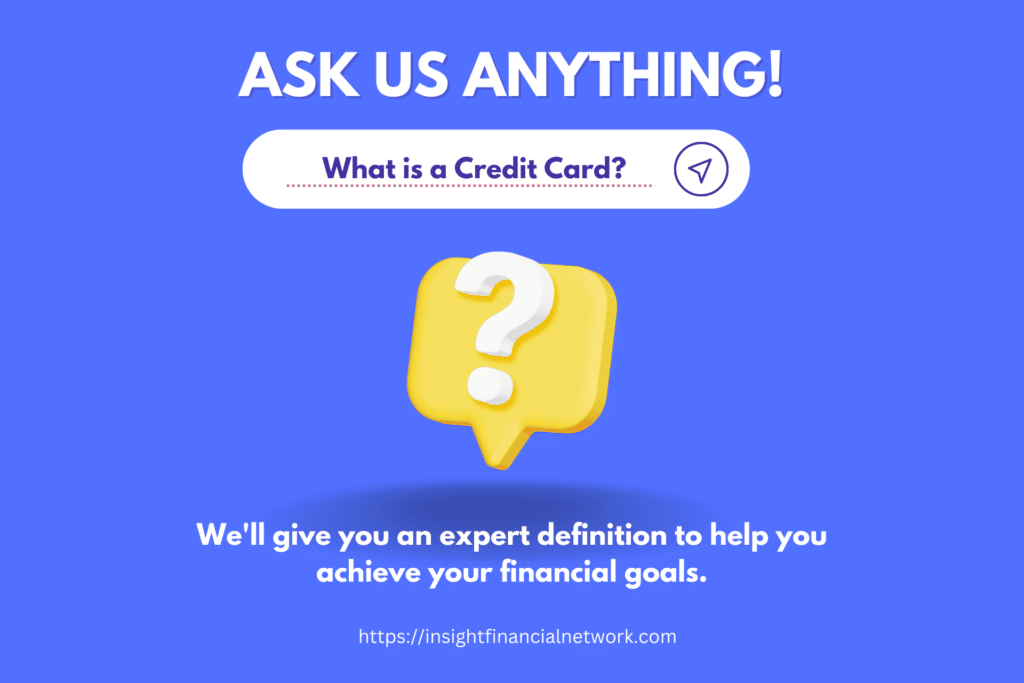Definition Explained with Real-life Examples and Strategies for Success
What is a Credit Card? Here’s What You Should Know
Have you ever wondered what exactly the credit card definition is and how it works? It might seem like a small piece of plastic, but it’s so much more than that. Credit cards can be powerful financial tools when used wisely, but they can also lead to some pretty tricky situations if you’re not careful.
In this post, we’ll break down the basics of credit cards, helping you understand how they work and how to use them responsibly.
So, stick around, and you’ll be well on your way to becoming a credit card pro. Your wallet will thank you!
Here’s What You Will Find:
Credit Card Definition
A credit card is a financial tool issued by a financial institution, typically a bank or credit union, that allows you to borrow money up to a certain limit to make purchases, pay bills, or even withdraw cash. This borrowed money, called credit, is essentially a short-term loan that you’re expected to repay, usually within a specific timeframe known as a billing cycle.
When you use a credit card, the financial institution essentially trusts you to pay back the amount you spend, plus any interest and fees that may apply. Your credit limit is determined based on factors such as your credit score, income, and repayment history, and it represents the maximum amount you can borrow at any given time.
Every month, you’ll receive a statement detailing your credit card transactions, the total amount owed, the minimum payment due, and the payment due date. Making at least the minimum payment on time is crucial to avoid late fees and potential damage to your credit score. However, paying off your balance in full each month is always better to avoid interest charges, as credit card interest rates can be quite high.
Credit cards can offer numerous benefits, including convenience, the ability to build a credit history, and access to various rewards and incentives. However, it’s important to remember that they should be used responsibly to avoid getting into debt or hurting your credit score.
By understanding how credit cards work and managing them wisely, you can make the most of this financial tool and set yourself up for a healthy financial future.

Real-Life Example:
Imagine you’ve just landed your first job, and you’re starting to become more financially independent. You decide to apply for a credit card to help manage your expenses and build your credit history. After some research, you will find a card with no annual fee and a cashback rewards program that suits your spending habits.
Upon approval, the bank assigns you a credit limit of $3,000. This means that you can spend up to $3,000 using the credit card, but you’ll need to pay it back according to the terms set by the bank. You begin using the card for everyday purchases, such as groceries, gas, and dining out, taking advantage of the cashback rewards offered.
You receive your first credit card statement at the end of the month. It shows your total balance of $800, a minimum payment of $25, and a payment due date. You decide to pay off the entire $800 balance before the due date, avoiding interest charges and lowering your credit utilization. This responsible use of credit helps you build a positive credit history, which will be beneficial when you apply for loans, mortgages, or other credit products in the future.
In this example, the credit card is a convenient financial tool that enables you to manage your expenses, earn rewards, and build your credit history, all while promoting responsible spending and repayment habits.
Final Thoughts
Credit cards can be incredibly useful financial tools when used responsibly. They offer convenience, rewards, and the opportunity to build a solid credit history, which can significantly impact your financial life. However, it’s essential to remember that using a credit card means borrowing money, and with that comes the responsibility of repaying your debts on time and in full whenever possible.
So, as you navigate the world of credit cards, always be mindful of your spending habits and credit utilization. Keep track of your purchases, pay attention to your monthly statements, and pay off your balance in full to avoid interest charges.
By doing so, you’ll be well on your way to harnessing the power of credit cards while maintaining a healthy financial future. Happy borrowing!

